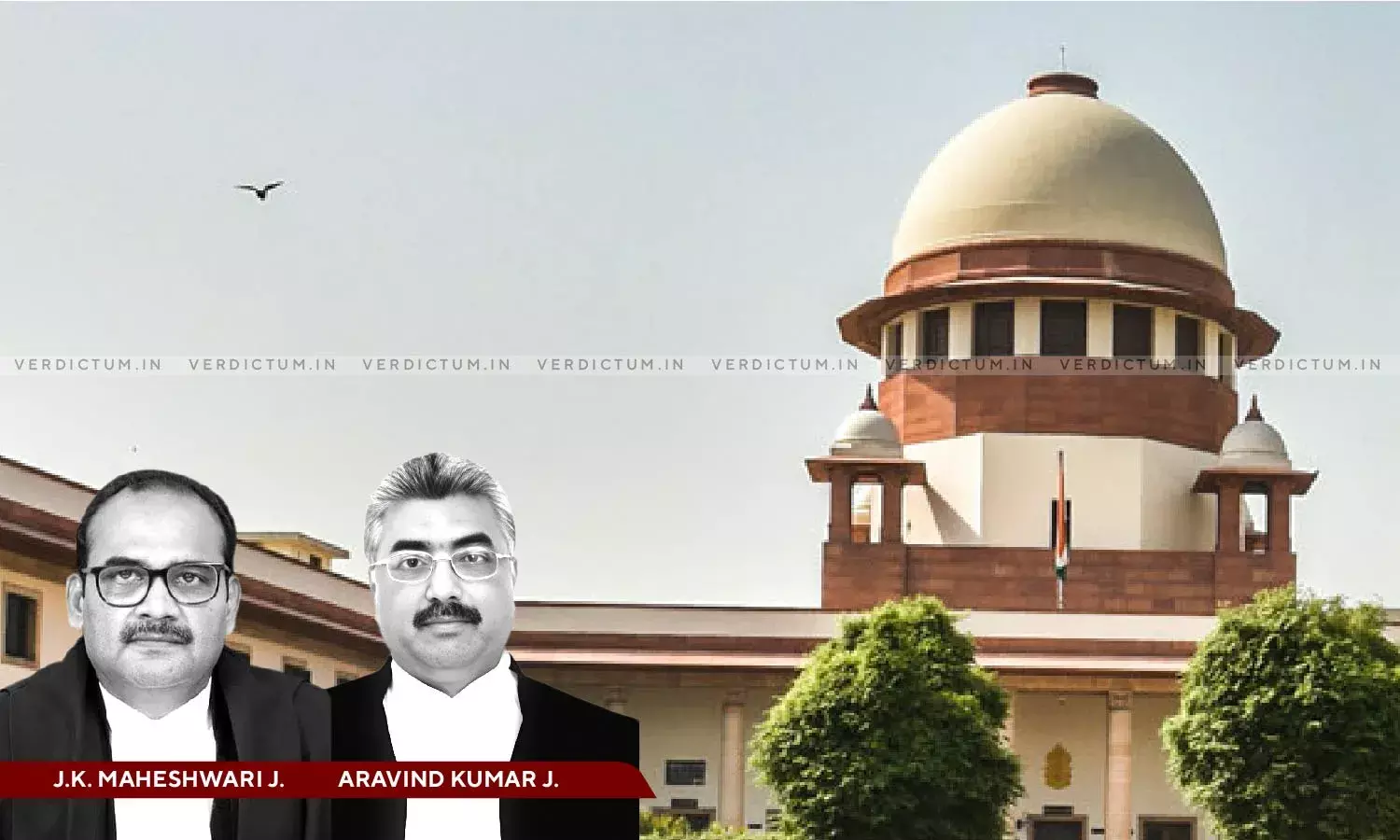Statutory Penalty Imposed Upon Employer U/S.4A(3)(b) Of Employees’ Compensation Act Not To Be Indemnified By Insurer: Supreme Court
The claimants preferred an Appeal against the Himachal Pradesh High Court order whereby the penalty amount under the Employees’ Compensation Act was reduced to a fixed amount of Rs. 30,000.

Justice J.K. Maheshwari, Justice Aravind Kumar, Supreme Court
The Supreme Court has reiterated that the statutory penalty which is imposed upon the employer under Section 4A(3)(b) of the Employees’ Compensation Act, 1923, is not to be indemnified by the Insurer. The Apex Court explained that the pre-requisite for imposing the statutory penalty is that the employer must default in payment of compensation due, and the Commissioner must conclude that the nonpayment is not justifiable.
The claimants preferred an Appeal against the impugned orders of the Himachal Pradesh High Court whereby the penalty amount under the Act was reduced from 50% of the award to a fixed amount of Rs. 30,000.
The Division Bench comprising Justice J.K. Maheshwari and Justice Aravind Kumar said, “It is a settled law that the statutory penalty which is imposed upon the employer under Section 4A(3)(b) of the Act is not to be indemnified by the Insurer.”
AOR Rameshwar Prasad Goyal represented the Appellant while AOR Akshay Verma represented the Respondent.
Factual Background
In an employee’s compensation claim filed by the parents of the deceased employee because of the untimely death of their 24-year-old son during his employment with the second Respondent– Employer, the Employees' Compensation Commissioner awarded a compensation of Rs 6,55,410 along with interest. In addition to this, a statutory penalty under Section 4A(3)(b) of the Employees’ Compensation Act, 1923 (Act), amounting to 50% of the award (Rs 3,27,705) was also imposed. The Commissioner fixed the liability to pay the entire amount upon the Insurer (First Respondent).
An appeal was filed by the first Respondent– Insurer, and the High Court reduced the compensation amount to Rs 4,36,940 along with interest. The statutory penalty was also reduced to Rs. 30,000. Additionally, the High Court fixed the liability to pay the statutory penalty amount solely upon the second Respondent – Employer. The appellants before the Apex Court mainly challenged the reduction of the penalty from 50% of the award to a fixed amount of Rs. 30,000.
Reasoning
The Bench, at the outset, said, “It is a settled law that the statutory penalty which is imposed upon the employer under Section 4A(3)(b) of the Act is not to be indemnified by the Insurer.”
The Bench further said, “The decision in Ved Prakash Garg (Supra) has been followed in L.R. Ferro Alloys Ltd. v. Mahavir Mahto, (2002) 9 SCC 450 holding that the Insurer is liable to indemnify the owner only for the compensation along with interest thereon and not the penalty imposed on the employer for default in payment of amount within one month from the date of incident. In view of the above, the direction of the High Court, fixing the liability to pay statutory penalty on the Employer only, requires no interference from this Court.”
The Bench referred to Section 4A(3)(b) which states that in case where the Employer has defaulted in payment of compensation due under the Act within one month from the date it fell due and the Commissioner thinks that there is no justification for the delay, the employer shall be directed to pay a further sum to the maximum of 50% of the award amount, by way of penalty. “Therefore, the necessary pre-requisite for imposing the statutory penalty under Section 4A(3)(b) is that the employer must default in payment of compensation due and the Commissioner must reach the conclusion that the nonpayment is not justifiable”, it held.
It was further noticed by the Bench that the High Court had not given any reason as to why the penalty amount as directed by the Commissioner was directed to be reduced to a lumpsum amount of Rs 30,000. The Commissioner had come to a specific finding of fact that the Employer had not paid any amount to the Claimants at the time of injury, nor had it paid anything when the claim was filed by the Appellants.
“Such a finding of fact by the Commissioner could not have been interfered with by the High Court in the First Appeal without a finding to the contrary that the Respondent No. 2 – Employer had indeed paid at least some amount due to the family of the deceased employee within a period of one month from the date of accident”, it held.Thus, the Bench directed that the statutory penalty under Section 4A(3)(b) be fixed at 30% of the compensation amount. The order of the High Court was modified to that extent without disturbing the finding of the High Court on the compensation and interest thereon awarded under Section 4A(3)(a) of the Act as well as the fixation of liability to pay the penalty amount on the Employer.
The Bench thus held, “In the present case, since the compensation amount as per the Commissioner’s award of Rs. 6,55,410/- has been reduced to Rs. 4,36,940/- by the High Court, 30% penalty thereon shall amount to Rs. 1,31,082/- for which the Respondent No. 2 - Employer 9 alone shall be liable to pay.”
Cause Title: Sheela Devi & Anr. v. Oriental Insurance Company Limited & Anr (Neutral Citation: 2025 INSC 516)
Appearance:
Appellant: AOR Rameshwar Prasad Goyal
Respondent: AOR Akshay Verma, Advocates G. Arudhra Rao, Rohan A. Naik, Devendra Singh

